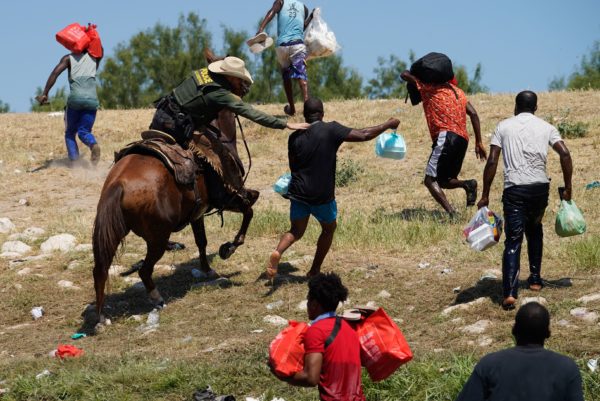The inhumane treatment and mass deportations of Haitian migrants are another chapter in America’s history of anti-Black racism, a new report by Amnesty International finds.
The report was published on the one-year anniversary of the publication of viral photos and videos that show U.S. Customs and Border Patrol agents flinging reins at the Black migrants near the U.S.-Mexico border in Del Rio, Texas. The CPD concluded in July that none of the Haitians were intentionally struck by Border Patrol agents, but it was excessive use of force.
The International Amnesty report released on Sept. 22 is based on interviews with 24 Haitians deported to the island nation between September 2021 and January 2022. It also includes testimony from psychologists, academic experts, lawyers and historical evidence.
“Our research provides ample evidence that systemic racism is embedded within the US immigration system, as described by Haitian asylum seekers interviewed for this report,” said Erika Guevara-Rosas, Americas director at Amnesty International.
Amnesty International is a human rights non-governmental organization headquartered in the U.K. The report shows that the U.S. immigration policies used to “intercept, detain and remove” Haitians since 1970 go against international law and are rooted in anti-Black racism. It is fittingly titled “They Did Not Treat Us Like People’: Race and Migration-Related Torture and Other Ill-Treatment of Haitians Seeking Safety in the USA.”
Since the border incident in September, the U.S. has expelled more than 25,000 Haitians under President Donald Trump’s Title 42 invocation. Part for federal public health law, the provision requires the deportation of asylum seekers from countries with communicable diseases. Trump’s administration invoked Title 42 in March 2020 in response to the COVID-19 pandemic. President Joe Biden’s administration carried out more deportations under the provision, however.
“They have also continued to evoke the evils of slavery by shackling and handcuffing Black Haitians onboard expulsion flights, inflicting further pain and mental suffering upon them that amounts to torture under international human rights law,” Guevara-Rosas said.
Amnesty International said deporting Haitian migrants in handcuffs and shackles caused them “severe psychological pain and suffering due to its association with slavery and criminality.” It was built on the treatment near Del Rio where agents on horseback accosted Haitian families, which many criticized as remisnsciant of slavery patrols. The organization adds that even though, the Biden administration investigated the incident, they did not speak to the migrants who were impacted “significantly undermining” the investigation’s credibility.

The report also shows that Haitians had a lack of access to sufficient food, health care, information, interpreters and lawyers during the process and in detention centers. Children as young as 14 days old were detained. Some were separated from their parents “in explicit violation of international law that protects children’s best interests.”
A woman identified in the report as Marjory said she was forced to breastfeed her 4-month-old baby in handcuffs and shackles.
“They did not treat people from other countries in this way. People from other places were allowed to talk to their families, they were brought to the hospital when they were sick, and treated them with humility, but Haitians did not find this same treatment,” she said.
At least five pregnant women were detained without consideration of their medical needs, the report says. Haitian migrant Yolande, recalled fainting several times while being detained.
“While in prison, they did not let us bathe. During seven days in prison, I never bathed nor had the chance to go the bathroom or brush my teeth,” she said. “We were transferred to another prison in Texas where I fainted again. I was weak and I still could not eat.”
In addition, none of the migrants interviewed for the report had the opportunity to go through fear-based screenings by asylum officers.
According to U.S immigration polices, a person going through expedited removal proceedings with “a credible fear of persecution or torture” can seek asylum before an asylum officer or an immigration judge.
Haiti has been ravaged by a slew of natural disasters, including massive earthquakes in 2010 and 2021. In July 2021, the island’s president was assassinated. President Jovenel Moïse’s presidency was marked with political unrest that escalated after his death. Reports show that since Moïse’s death, gang invasions have been prevalent, leading to mass killings, including “beheadings, chopping and burning of bodies.”
The Office of the United Nations High Commissioner for Human Rights has reported 934 killings, 684 injuries and 680 kidnappings across the Haitian capital. According to the office, since June 2021, an average of 75 people, mostly women and girls, including children as young as 2 years old has suffered sexual violence at the hands of gangs.
Amnesty International points out that systemic racism is deep-rooted in America, while international human rights law requires nations to eliminate all forms of racial discrimination. The organization is calling on the Biden administration to stop the Title 42 expulsions, reverse all anti-Black policies, and conduct a full review of the disparate treatment of Black people seeking protection from the immigration system.


